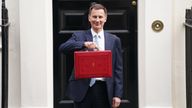UK manufacturing suffers steepest fall since May 2020
Slowing demand from key markets such as China and the United States, coupled with logistics issues caused by Brexit and the pandemic, has created a bleak outlook for factories.
Thursday 1 September 2022 10:54, UK
British manufacturing production and new orders collapsed in August, falling by the most in two years amid fears about a worsening economy.
Last month's output saw its largest contraction since the height of the pandemic in May 2020, according to the latest S&P Global/CIPS UK Manufacturing Purchasing Managers' Index (PMI).
The index dropped to 47.3 from 52.1 in July - numbers above 50 generally correspond with growth, and numbers below 50 indicate a contraction.
According to S&P Global, companies experienced a steep downturn in new orders in August, with interest from domestic and overseas clients falling heavily. This led to the supply of new jobs grinding to a halt, and a drop in business optimism, they added.
August’s PMI data "suggests that a recession is developing in the manufacturing sector," said Gabriella Dickens, senior UK economist at Pantheon Macroeconomics.
With most indicators in the survey flashing red, Ms Dickens said it was no surprise "that manufacturers are the least confident about the 12-month outlook since April 2020".
"The bleak outlook now is weighing on demand for labour," she said.
Demand from critical markets such as China, the United States, and the European Union was weak last month, S&P Global said, exacerbating issues with supply chains and logistics hubs that are a hangover from the pandemic and Brexit.
One positive sign was the cooling of input costs for manufacturers, with the prices of raw materials, containers, and electronics all slowing down by their biggest margin since November 2020.
"This morning's PMI figure, indicating recessionary performance in the manufacturing sector, is the worst in two and a quarter years," said James Brougham, senior economist at Make UK.
"This morning's data is a significant, and perhaps the last, warning shot for government. Immediate intervention is necessary to mitigate the worst of the economic damage to the industry's fabric.
"Many of our European peers have already moved to such action, something the UK government should look to mimic if the UK manufacturing base is to keep its head above water," he said.



